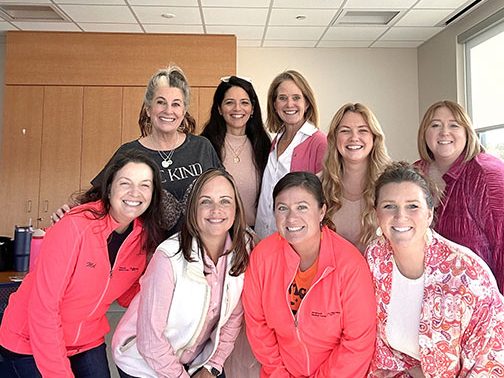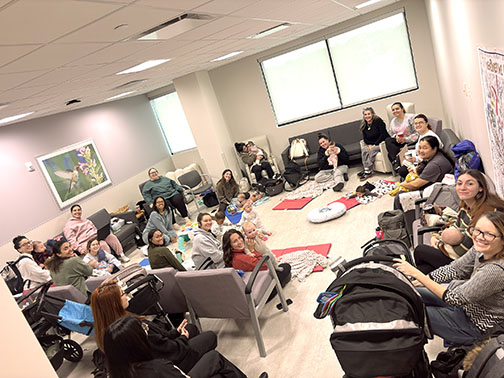
By Jamie Jablonowski, MPH, BSN, RN, CPH
EATONTOWN – While being pregnant is celebrated with showers, knitted blankets and newly painted nurseries, many families are often unprepared for the realities of coming home with a newborn. Parents expect it to be hard – sleepless nights, diaper changes and navigating a new normal – however, many are unprepared for the intense effect pregnancy and childbirth can have on maternal mental health.
According to Postpartum Support International (PSI), 1 in 5 women may experience depression and anxiety during the perinatal period, with the numbers likely higher for high-stress parenting groups. In 2024, the Children’s National Hospital completed an extensive evidence review of maternal mortality and reported that 1 in 4 maternal fatalities are attributable to mental health disorders.
Lisa Tremayne, a nurse, survivor and advocate for perinatal mood and anxiety disorders (PMAD), estimates this number to be far higher. Tremayne highlights that while the media usually shows severe cases, perinatal health is not black and white, and there is a spectrum of anxiety and depression where many women can receive help during one of the most challenging periods of their lives.
In 1999, Tremayne became pregnant with quadruplets after six years of trying for a baby. Unfortunately, she lost one child in utero, eventually giving birth to triplets on Christmas Day. “They were only 30 weeks, so they were like 2 pounds each but totally healthy, they just had to grow. No one required any surgery or anything and I was fine. That’s what I kept saying: I was fine.” Within a few days of all three children being home, her husband had to go back to work. “Within three days, I hadn’t slept one wink at all. And I had no help. And I couldn’t see the light at all,” she said.
Tremayne became more involved in perinatal health over the next two decades and, in 2017, she established New Jersey’s first Center for Perinatal Mood and Anxiety Disorders located at the RWJBarnabas Anne Vogel Family Care and Wellness Center in Eatontown. The center treats pregnant women and women up to one year postpartum, offering counseling services, medication management and support groups twice a day. Women are encouraged to bring their babies with them.

What are Perinatal
Mood and Anxiety Disorders?
Perinatal mood and anxiety disorders are mental health conditions during the pregnancy or postpartum period. They include postpartum depression (PPD), postpartum anxiety (PPA), postpartum obsessive-compulsive disorder (OCD), postpartum post-traumatic stress disorder (PTSD), postpartum psychosis and depression or anxiety during pregnancy.
Tremayne has worked tirelessly to help break the stigma and bring awareness to the spectrum of PMADs. “By saying postpartum depression, we’re not even reaching the women who need it and we’re calling it the wrong name, which gives it a stigma,” said Tremayne. She added that 90% of the patients at the Center for Perinatal Mood and Anxiety Disorders are seen for anxiety.
The Risk Factors
Tremayne said there is a misconception about the type of women who are treated for mental health conditions. “We have (the) type A perfectionist – career-driven, college-educated women who are project managers and nurses and doctors and run the ships,” said Tremayne. “I think the stigma is that it’s a different type of mom.” But, she noted, anyone can fall prey to these disorders.
Recognized risk factors include:
• History of depression, anxiety/OCD or postpartum depression, bipolar disorder or psychosis, diabetes, thyroid problems and/or premenstrual dysphoric disorder (PMDD)
• Perfectionist/Type A personality
• A family history of mental illness
• Past or current trauma (e.g., domestic violence, verbal abuse, sexual abuse, poverty, loss of a parent)
• Experiencing a stressful event in the last year (e.g., house move, job loss, divorce, relationship problems or the death of a loved one)
• Being a single mom
• Lack of help or support at home from a partner or family members
• Financial stress
• Infertility treatment
• Previous miscarriages, stillbirths or abortions
• Expecting multiples
• Being away from a home country or culture
• High-risk pregnancy
Symptoms of Perinatal
Mood and Anxiety Disorders
Kristy Champignon is a perinatal mental health certified counselor and co-owner of Meadowlark Counseling, Supervision, & Consultation in Shrewsbury. After her own challenging postpartum experience, she pivoted into helping parents.
“I was completely humbled,” said Champignon. “Before we had my son, I was getting classes on lactation and sleep.”
“I didn’t even think to consider the mental health aspect,” she said.
Being an experienced therapist, she thought she felt prepared. “I was so startled in how terrible I felt and how different I felt and how out of control my mood felt. It was completely like an experience I had never lived through before,” Champignon said.
The “baby blues” – feelings of depression or anxiety in the first two to three weeks after childbirth – are very common and normal. However, if these symptoms persist or worsen, it may be time to get help.
Symptoms of PMADs can include: difficulty sleeping or sleeping too much; anxiety all or most of the time or panic attacks; feelings of guilt, worthlessness or shame; sadness or frequent crying; loss of interest in things you used to enjoy; obsessive, racing, scary thoughts; excessive irritability, anger or rage; and fear of being left alone with the baby, or that you are not a good enough mother.
When to Seek Support
Women do not need to feel like they’re experiencing severe symptoms to seek care. Champignon believes all women deserve support, regardless of how mild or severe the symptoms present. “I think there’s this big misconception that if I’m just upset intermittently, it’s just the baby blues,” she said, explaining that a woman could feel fine one minute and have debilitating anxiety the next.
Champignon reported that most of her clients come in with their second pregnancy after experiencing perinatal mood or anxiety disorders with their first, wanting to avoid the same suffering they experienced the first time. Many share that they did not give themselves permission to seek care with their first pregnancy.
“This is a time period or a season of life where everyone deserves a little extra care because it is the most stressed you will possibly ever be. And we really encourage people that if you’re able to, please go get help,” said Champignon.
How to Help a
Friend or Family Member
New parenthood can be one of the most vulnerable times in a person’s life and many find themselves struggling to ask for help or even to know what to ask for.
Local women were asked about their postpartum experience, and these are the ways they reported feeling most supported during those early days after childbirth:
• Offer to hold the baby or babysit so mom can rest, shower, go on a date night with their partner, etc.
• Call or text to check in
• Listen
• Provide home-cooked meals
• Lend or gift baby items
• Offer to watch siblings while mom tends to the new baby
• Help with cleaning
• Lower expectations for attending social events
Women also shared how they want new mothers to give themselves grace and to let others help. They said mothering a newborn is difficult and, along with joy and gratitude, there can be anxiety, isolation, intrusive thoughts and rage. They encouraged women to remember it is temporary and ignore the mom-fluencers on social media; no postpartum experience is perfect and everyone is different.

Kristy Champignon, co-owner of Meadowlark Counseling, Supervision & Consultation, and Erin Haney, founder and owner of Raising Sunshine, realize the importance of helping new mothers and others. Courtesy Meadowlark
Healing and Helping Others
Fortunately, the number of resources continues to grow as women recover and devote themselves to helping other women and building community. Erin Haney, founder and owner of Raising Sunshine, a community play and coworking space in Shrewsbury, decided to create her dream early childhood community following the birth of her son. After a traumatizing birth and postpartum experience, Haney wanted other parents to have the resources she had sought.
In 2021, she started Raising Sunshine, offering local sensory and cooking classes for children at local venues. Last year, she expanded and opened her own play space. In addition to offering classes, summer camps and seasonal activities for children, Raising Sunshine provides a coworking space for parents while their children play. Haney also partners with several organizations offering support for mothers, including a Toddler Support Group on Tuesday afternoons.
“During my time working in early intervention and while on my own challenging postpartum journey, I saw such a need for a safe space for families, especially moms, to come together. No judgment, come as you are, just be together in community,” said Haney. “So many moms struggle tremendously before finding the support they need. What if we could be a safe place to land and offer support before things get dark?”
Champignon, Tremayne and Haney have all partnered in some way with each other to provide a network of support for new parents. They continue to expand this community in the hope of providing the resources and environment they needed when they were navigating the early days of motherhood.
“There’s so many people sending out that this is the best time of their life and it’s not,” Tremayne said. “When you’re in the trenches, it’s not fabulous.”
While she said those days will come, during the early days, many women feel they’re having a hard time. These women are here to help.
The article originally appeared in the May 1 – 7, 2025 print edition of The Two River Times.














